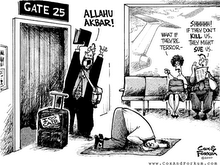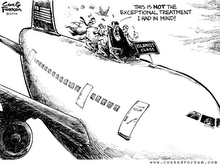Three terrorist suspects were in police custody Sunday and a fourth man was under guard in a hospital after a flaming jeep crashed into a Scottish airport and two car bomb plots were foiled in central London.
Britain raised its terror alert to "critical" — the highest possible level — and the Bush administration also announced plans to increase security at airports and on mass transit in the United States.
"This weekend's bomb attacks signal a major escalation in the war being waged on us by Islamic terrorists," Lord Stevens, terrorism adviser to Britain's new prime minister, Gordon Brown, said in a column in Sunday's News of the World newspaper.
"Now al-Qaida has imported the tactics of Baghdad and Bali to the streets of the UK," said Stevens, who is London's former police chief.
London police said extra officers were being deployed at landmarks, airports, train stations and bus terminals across the capital Sunday, and had been ordered to step up the use of stop and search powers. Armed police would patrol at major rail stations, it said.
At least 450 officers would monitor a rock concert at London's Wembley Stadium on Sunday to mark the 10th anniversary of Princess Diana's death, police said.
The Jeep Cherokee rammed into Glasgow's airport terminal on Saturday, shattering glass doors just yards from passengers at the check-in counters. Police said they believed the attack was linked to two car bombs found in London the day before.
One of the men in the car was in critical condition at a hospital with severe burns, while the other was in police custody, said Scottish Police Chief Constable Willie Rae. Five bystanders in Glasgow were wounded, although none seriously, police said.
Rae said a suspect device had been found on a man wrestled to the ground by officers and hospitalized in critical condition with severe burns.
British media said the man was wearing a suicide belt and that police had found propane gas cylinders in the Glasgow Jeep. But police later said an initial inspection by explosives experts had not found a suicide vest. Rae made no mention of gas cylinders.
Police later arrested two more suspects in the London and Glasgow plots in Cheshire county in northern England, Scotland Yard said early Sunday.
"I can confirm that we believe the incident at Glasgow airport is linked to the events in London yesterday," Rae said at a news conference. "There are clearly similarities and we can confirm that this is being treated as a terrorist incident."
Police foiled the earlier plot Friday after two cars were found in central London packed with explosives — one outside a nightclub near Piccadilly Circus and another parked nearby.
A British government security official said the methods used in the airport attack and Friday's thwarted plots were similar, with all three vehicles carrying large quantities of flammable materials. The official spoke on condition of anonymity because of the sensitivity of the information.
Police and MI5 had no specific intelligence warning of a plan to attack Scotland, but they have monitored a host of suspected terrorists and plots there, he said. It was not yet clear whether there was an international element to the planning or funding of the attacks, the official said.
The new terror threat presents Prime Minister Gordon Brown, a Scot who took office on Wednesday, with an enormous challenge and comes at a time of already heightened vigilance one week before the anniversary of the July 7 London transit attacks, which killed 52 people.
"I know that the British people will stand together, united, resolute and strong," Brown said Saturday in a televised statement.
The green Jeep barreled toward Glasgow's main airport terminal shortly after 3 p.m. Witness Scott Leeson said bollards — security posts outside the entrance — stopped the driver from driving into the bustling terminal, but the nose of the vehicle smashed the glass doors.
"If he'd got through, he'd have killed hundreds, obviously," he said.
AP photographs from the scene showed the car hit the building at an angle and was poking into the terminal. The Jeep struck the building directly in front of check-in counters, where dozens of passengers were lined up, police said.
Lynsey McBean, a witness at the terminal, said the driver kept trying to push the car forward after it got stuck, and "the wheels were spinning and smoke was coming from them."
She said one of the men then took out a plastic gasoline canister and poured a liquid under the car. "He then set light to it," said McBean, 26, from Erskine, Scotland.
Police subdued the driver and a passenger, both described by witnesses as South Asian — a term used to refer to people from India, Pakistan, Afghanistan and other countries in the region. The previous round of terrorist activity in Britain, in July 2005, was largely carried out by local Muslims, raising ethnic tensions in Britain.
Witnesses said one of the men was engulfed in flames and spoke "gibberish" as an official used a fire extinguisher to douse the fire.
On Sunday morning, the Glasgow airport was reopened to flights and to travelers who entered the terminal through a police cordon.
John Lennon Airport in the northwestern city of Liverpool was closed overnight after a suspicious vehicle found nearby. The vehicle was taken away for forensic examination and the airport was reopened at 4:40 a.m., police said.
Meanwhile in London, police were gathering evidence from closed circuit television footage, as forensics experts searched for clues into the foiled bombings. The two Mercedes cars had been loaded with gasoline, gas canisters and nails in one of the capital's busiest areas on a night when Londoners like to go out and party. Security officials and police denied an ABC News report that they had a "crystal clear" picture of one suspect from CCTV footage.
The vehicles were found abandoned in the early hours of Friday in what police believe was an attempt to kill scores or even hundreds of people. Detectives said they were keeping an open mind about the bombers' identities, but terrorism experts said the signs pointed to a cell linked to or inspired by al-Qaida.
In the United States, airports and mass transit systems also were tightening security, though the U.S. did not plan to raise its terror alert status, the Bush administration said.









No comments:
Post a Comment